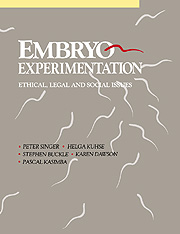Book contents
- Frontmatter
- Contents
- Foreword
- ACKNOWLEDGEMENTS
- INTRODUCTION
- PART 1 THE SCIENTIFIC ISSUES
- PART 2 THE ETHICAL ISSUES
- ARGUMENTS ABOUT THE STATUS OF DIFFERENT DEVELOPMENTAL STAGES
- ARGUMENTS FROM POTENTIAL
- EMBRYO RESEARCH AND WOMEN
- PART 3 CONTROLLING EMBRYO EXPERIMENTATION IN A DEMOCRATIC SOCIETY
- FORMING A PUBLIC POLICY
- LEGISLATION AND ITS PROBLEMS
- 17 Biological processes and moral events
- 18 Embryo experimentation: The path and problems of legislation in Victoria
- 19 The syngamy debate: When precisely does an embryo begin?
- APPENDICES
- GLOSSARY
- NOTES ON CONTRIBUTORS
- INDEX
17 - Biological processes and moral events
Published online by Cambridge University Press: 05 June 2012
- Frontmatter
- Contents
- Foreword
- ACKNOWLEDGEMENTS
- INTRODUCTION
- PART 1 THE SCIENTIFIC ISSUES
- PART 2 THE ETHICAL ISSUES
- ARGUMENTS ABOUT THE STATUS OF DIFFERENT DEVELOPMENTAL STAGES
- ARGUMENTS FROM POTENTIAL
- EMBRYO RESEARCH AND WOMEN
- PART 3 CONTROLLING EMBRYO EXPERIMENTATION IN A DEMOCRATIC SOCIETY
- FORMING A PUBLIC POLICY
- LEGISLATION AND ITS PROBLEMS
- 17 Biological processes and moral events
- 18 Embryo experimentation: The path and problems of legislation in Victoria
- 19 The syngamy debate: When precisely does an embryo begin?
- APPENDICES
- GLOSSARY
- NOTES ON CONTRIBUTORS
- INDEX
Summary
In the course of discussing the moral acceptability of embryo research, the Warnock Report makes the following observation:
While … the timing of the different stages of development [of the embryo] is critical, once the process has begun, there is no particular part of the developmental process that is more important than another; all are part of a continuous process, and unless each stage takes place normally, at the correct time, and in the correct sequence, further development will cease. Thus biologically there is no one single identifiable stage in the development of the embryo beyond which the in vitro embryo should not be kept alive. However, we agreed that this was an area in which some precise decision must be taken, in order to allay public anxiety.
This passage is important because it draws attention to a way of thinking about the moral issues raised by the new biotechnology which has a considerable appeal. The way of thinking in question sees a crucial moral significance in the continuity of the processes which constitute the development of a human infant. It understands the continuity of the developmental processes to debar the drawing of any moral distinctions except at the beginning and end of the process. The view is commonly, though not always, expressed in the claim that the drawing of moral distinctions in such cases is wholly arbitrary.
- Type
- Chapter
- Information
- Embryo Experimentation , pp. 195 - 201Publisher: Cambridge University PressPrint publication year: 1990



